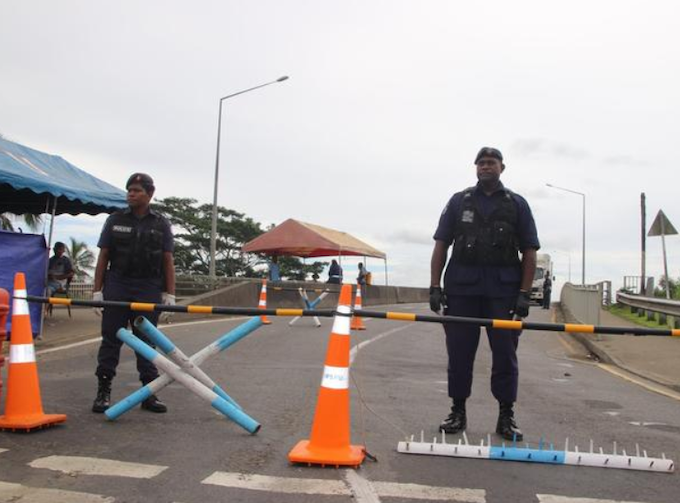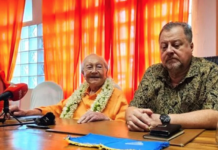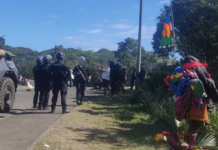By Christine Rovoi, RNZ Pacific journalist
A proposed draft Police Bill in Fiji has come under intense scrutiny from civil society groups and opposition parties.
The draft legislation will give police greater surveillance powers if passed in Parliament.
The proposal is now open to public submissions and the government says it will replace the Police Act 1965.
- LISTEN TO RNZ DATELINE PACIFIC: The draft Fiji Police Bill (duration 5:00
- READ MORE: Other Fiji police reports
The draft Bill gives police the powers to secretly or forcefully enter any premises to place tracking devices.
Police can secretly monitor and record communications of people they suspect are about to commit a crime or have committed one, the Bill states.
The draft law also allows police to recruit an informer or anyone else who can provide information in relation to a police matter.
The government has not stated why it is necessary for police to search a crime scene and seize potential evidence without a warrant as stated in the Bill.
Police powers need ‘updating’
But the Minister for Police, Inia Seruiratu, said the Police Act 1965 needed to be updated because officers were now tasked with enforcing laws aligned to new and emerging challenges such as the global govid-19 pandemic, terrorism, transnational organised crime and other crimes evident around the globe.
Seruiratu said the Bill was a preliminary draft of submissions received by police during three days of consultations with the force’s key stakeholders in May 2019.
“Policing has developed beyond the traditional roles it is known for and the Fiji Police Force needs an enabling foundation that not only assists them in the work they are constitutionally mandated to do but will greatly enhance our national efforts to effectively respond to the rapidly evolving criminal landscape.”
However, the opposition parties have condemned the draft legislation and warned it encroaches on the civil liberties, democratic values and fundamental rights of Fijians.
The leader of the Social Democratic Liberal Party, Viliame Gavoka, said they would do everything in their power to ensure the draft legislation did not reach the floor of Parliament.
Gavoka said the “draconian” draft Bill would turn Fiji into a “police state”.
“There’s lots of uproar in the community about police brutality as it has been ongoing for some time,” he said.
“And then to introduce a Bill like this is truly frightening.
People ‘fearful of the police’
“The mentality of the country right now is fearful of the police. And here we have a Bill that gives them more powers to virtually do whatever they want to do with you.”
The president of the National Federation Party, Pio Tikoduadua, said the government’s plan to introduce a law that could allow authorities to enter and search anyone’s property through force at any time was “frightening”.
Tikoduadua said it was “inconceivable, ridiculous and insane”, adding a provision in the proposed Bill would make police force subject to military law in emergencies.
“So, when police are subjected to military law, does it make them soldiers? This is unthinkable in a democracy. It is martial law and can be invoked at any time.”
Former opposition leader Mick Beddoes said the proposed legislation would empower the police to suppress instead of protecting the people who had paid $US1.8 billion in wages to the security forces since 2017.
Beddoes said the Bill would dilute people’s constitutional rights and impose on them some of the harshest penalties and fines.
He said the proposed new law was ‘unwarranted and unjustified’.
NGOs claim draft Bill violates rights
The draft bill also forbade officers from joining a union and it would be unlawful for them to go on strike or to take any other type of industrial action.
Human rights activist Shamima Ali said this violated the fundamental rights of police officers who risked their lives on the front-line to ensure Fijians were safe.
Speaking at the International Women’s Day in Suva this week, Ali said i was time to push the barriers.
“The Police Bill has the potential to further shrink us,” she said. “We might think, ‘oh it doesn’t concern us. We’re only concerned with bread and butter’. This concerns everyone.
“We already have high rates of police brutality, pending cases and other criminal allegations. There are some hardworking, honest officers in the force but there are also the bad cops.”
The Coalition on Human Rights said this was not the time to be giving police more powers when Fiji was facing a pandemic of police brutality cases where individuals had lost their lives at the hands of police.
Its director, Nalini Singh, said this was unacceptable and a disgraceful reflection on the force which should be the bastion of lawfulness in this country.
Raised human rights concerns
“As the Coalition on Human Rights, we have repeatedly raised our concerns about the excessive force used by the Police during arrests on individuals, and the lack of transparency and urgency from the Police in investigation processes.
“And yet our call for urgent action have been left unanswered. This proposed Police Bill 2020 is a sad reflection of Fiji’s priorities in its commitments towards upholding and respecting human rights of Fijians.
According to data from the Office of the Director of Public Prosecutions, between May 2015 and April 2020, 400 police officers were charged with serious violent-related offences.
The ODPP data showed the offences included 16 charges of rape, two charges of murder and nine charges of manslaughter.
The largest women’s group in Fiji, Soqosoqo Vakamarama iTaukei, said police officers had the right to be part of a union.
The group’s spokesperson, Adi Finau Tabakaucoro, said the Bill was supposed to help facilitate the work of the force.
Meanwhile, the Human Rights and Anti-Discrimination Commission said it would, in its substantive submission, call for alignment of the Bill with the state’s human rights obligation under the domestic procedures and international conventions and treaties that Fiji had ratified.
Submission after tabling
Commissioner Ashwin Raj said his office would make its submission when the Bill was tabled in Parliament.
Raj said any commentary on the draft bill, before it was tabled in Parliament, was “premature”.
Meanwhile, police and the roads authority received an application for a protest permit march next week against the draft bill.
Lautoka-based businessman Ben Padarath also lodged applications with the Suva City Council.
The move has been supported by Opposition Whip Lynda Tabuya who said she would gather signatures for a petition to be presented to Parliament when it sits next month.
This article is republished under a community partnership agreement with RNZ.














































